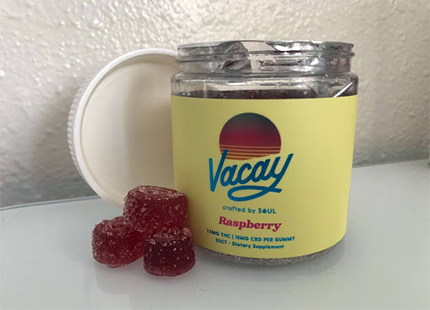
Disclaimer: None of the information in this article constitutes medical advice. All statements are merely the opinion of the writer(s). We recommend that patients follow their doctor’s guidance in regard to THC use.
THC gummies are becoming a popular over-the-counter (OTC) sleep remedy. Many brands tout the sleep-promoting benefits of their gummies, positioning them as a natural alternative to sleep medication.
But is THC shown in research studies to improve sleep, or are these just marketing claims? Do THC gummies contain an effective dose? Do they have unhealthy additive ingredients? And what was our Product Tester's honest experience trying THC gummies for sleep?
In this article we’ll answer all of these questions and more as we analyze medical studies on THC for sleep to give our take on whether it’s likely to be effective, or if it’s a waste of money.
We’ll share our concerns about some of the additive ingredients in THC gummies, and share our Product Tester's honest experience trying THC gummies to improve sleep.
Key takeaways:
- Research on THC for sleep is inconclusive
- Our Product Tester tried THC gummies for sleep and experienced no benefit
- We do not currently recommend THC gummies for sleep
Does THC Even Improve Sleep?
THC, short for tetrahydrocannabinol, is a psychoactive cannabinoid derived from the cannabis plant. This compound has been studied in clinical trials for its effects on sleep.
A medical review published in the Neurotherapeutics journal documented that THC can reduce time-to-sleep initially, but may reduce total sleep time after long periods of use.
A 2022 medical review suggested that THC may have a negative impact on sleep-related quality of life:
“THC…was associated with a ‘hangover effect’ the next morning. In addition, patients experienced temporal disorganization.”
A clinical trial published in the Journal of Sleep Research found that cannabis oil improved sleep quality, but cannabis oil has many other psychoactive compounds beyond THC.
Based on the available research, we consider isolated THC unlikely to improve sleep quality, with the research on whole cannabis appearing more promising.
We Tried THC Gummies for Sleep

One of our product testers named Matt Donnelly tried THC gummies for sleep. Here's his experience:
It was my first time trying THC gummies, and I didn’t experience any significant effects initially.
I was introduced to them as being helpful for sleep, so I consumed one gummy about an hour before bed.
I did not sleep any better or worse. However, when I consumed a gummy earlier in the evening, it produced a sort of euphoric “high” feeling, which is what is intended.
I did not experience any significant side effects, though I felt a little groggy the next morning.
I would rate this solution for sleep 3/10, and I do not plan to try it again nor would I recommend it to others.
Are THC Gummies Unhealthy?

The ingredients above are from a THC gummy brand called Kush Queen.
While researching this article, we searched “THC gummies” in Google and this brand was the top organic result.
This ingredient list illustrates why we consider most THC gummies to be unhealthy. They’re formulated to look and taste like candy, and contain inactive ingredients that may be questionable from a health perspective.
Sugar and glucose syrup are both forms of added sugar, and added sugar consumption in excess is associated with obesity and cardiovascular disease, according to a 2019 medical review.
Many Americans already consume too much added sugar from their diet, so intaking additional added sugar from supplements may be harmful in some cases.
Citric acid is a flavor enhancer that can cause whole-body inflammation, as we documented in our article on do CBD gummies work for pain.
Natural flavors is a broad categorical descriptor that fails to identify the specific flavoring agents used.
FD&C Color refers to artificial food dye. Typically the manufacturer lists the specific food color used, but nonetheless a 2012 medical review on the potential consumer harm from food dyes concluded with the study author’s opinion that all commercially-available dyes should be removed from the market for safety reasons.
We haven’t come across a THC gummy brand that we consider to have a healthy formulation, and speaking with a doctor about THC oil (if it’s available in your jurisdiction) may be a healthier choice.
What Happens If You Overdo THC Gummies?
A YouTube creator named “Chubbyemu” who’s a pharmacist has a video on what happened when an individual ate 96 THC gummies in one sitting, that has over 2 million views:
Our Clean Sleep Picks

Ritual BioSeries Melatonin is our top premium sleep supplement.
It provides an effective dose of melatonin, which is clinically shown to improve sleep quality, and which is arguably the best-studied compound for sleep support.
Nolah Weighted Bamboo Blanket is a great option for consumers who prefer non-supplement solutions for sleep. Weighted blankets are clinically shown to improve sleep quality in both older adults and in children, and early research suggests they may also reduce anxiety.
Both of the products recommended in this section are entirely free of ingredients or materials that we consider to be unhealthy.




























































